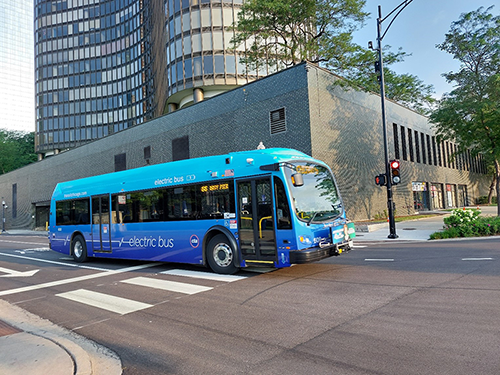Transit Vehicle Innovation Deployment Program

What's New
- On December 4, 2024, FTA published the Effectiveness of Wireless Charging for Electric Transit Buses - An Industry Report (Report 0270) report that presents the results of a study on the effectiveness of wireless charging as an alternative to wired charging and includes recommendations for deploying wireless charging for public transportation, as mandated in the FY 2023 House Transportation, Housing, and Urban Development Appropriation Report.
Overview
FTA established the Transit Vehicle Innovation Deployment program to develop innovative research, demonstration, and industry outreach projects for advancing the development and commercialization of new propulsion technology transit buses.
Transit Vehicle Innovation Deployment Centers (TVIDC) provide demonstration and testing facilities to research the next generation of public transportation vehicle technology and facilitate an integrated, cohesive public transportation innovation deployment network. TVIDC facilities enable FTA to:
- Convene transit agencies and U.S. transit vehicle manufacturers involved in researching, testing, deploying, and commercializing new propulsion technologies and related components.
- Assess ways to support transit agencies’ modernization efforts to move to new propulsion technology vehicles.
- Provide a repository for tech transfer and education, collecting the field research, data, and information to share with the public transportation industry.
FTA’s research goals include:
- Fostering sustainable and resilient systems for transit vehicles and infrastructure.
- Exploring ways to charge and optimize charging costs and operations for large, small, and rural transit agencies.
Organizational Support
Through the TVIDC program FTA supports the continued innovation, development, and adoption of next generation transit technologies that are made in America. FTA also developed a resource center for transit agencies to implement best practices in next-generation vehicle deployment and to house the research and publications developed under the program.
Statutory Reference
FTA Public Transportation Innovation Program (49 U.S.C. § 5312)
Featured Resources
Effectiveness of Wireless Charging for Electric Transit Buses - An Industry Report - December 2024
This report presents the results of a study on the effectiveness of wireless charging as an alternative to wired charging and includes recommendations for deploying wireless charging for public transportation, as mandated in the FY 2023 House Transportation, Housing, and Urban Development Appropriation Report.
